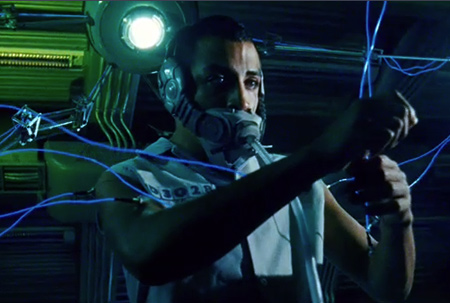 Tripping at the borderSleep Dealer
Tripping at the borderSleep Dealer is a bright, shiny, hard-working little sci-fi movie that bristles with allegorical and literal messages about technological imperialism, globalization, the exploitation of foreign labor and other serious matters. It's also about the theme of Sterne's
A Sentimental Journey: a "traveler" who essentially stays at home--and about how the world's clamoring have-not South in the future will be as full of technology as he North, as indeed it is already. The means of exploitation will be extended into the land of the exploited.
What saves this heavy talk is a soulful innocent who's connected, or
'branché,' as the French say--in the most literal sense: he gets fitted with electronic "nodes" all along his arms, neck, and back, so he can be plugged to a central computer in at the border and thereby help America to achieve its fondest dream: making others do all the menial physical work, but without allowing them to enter the country. Thus Mexicans in virtual factories, at a distance, in 12-hour night shifts, walled off by a militarized barrier, do America's hard labor by proxy just outside the actual physical USA. Memo (Luis Fernando Peña),
Sleep Dealer's young hero, comes to the "Sleep Dealers" in a mixture of desperation and hope, to save what's left of his little family in a rural village in Oaxaca.
Memo isn't a lily-white Candide. He has hope and love to give, but he also has a kind of primal curse upon him: he has caused disaster to his nearest and dearest by eavesdropping on a totalitarian northern force that sends drones to make strikes anywhere and blow up what it defines as "bad guys." They detected his radio, assumed he was an enemy, and brought down tragedy on his family. Both as penance and because nothing keeps him in the village any more, he goes to Tijuana, "the world's largest border town," and gets a pretty woman named Luz (Leonor Varela) whom he meets on the bus to fit him with the necessary set of body nodes. She calls herself a writer. Actually she works for a high tech firm that sells memories.
All the machinery in
Sleep Dealer is grotesque and comic but it works inexorably to serve the North. Farming has become impossible for Memo's father since the river was damed and a private company took control of the local water supply. In their part of Oaxaca the "future" has become a thing of the past, the father says. They must appease a machine that will shoot them if they disobey, just for permission to go to a river and collect water that they must pay for. Later another threatening gadget gobbles up Memo's 'Sleep Dealer' earnings and transfers them, minus a big fee and taxes, to his family further south. He can talk to his mother and brother on a videophone.
It seems an unintentional irony in Rivera and David Riker's screenplay that the man who ultimately helps Memo and his family, though of Hispanic origin, is an American "pilot,' himself "connected by nodes: the system not only stands for immigrants who can't work at home but for how technology alienates people from real work everywhere.
Sleep Dealer was made after a long struggle through Sundance financing, and got good buzz at the Sundance Festival itself. Because the Hispanic-oriented distributor Maya is buying the film and may finance a substantial stateside theatrical release, Rivera was saying in December, it may have a better fate than the mere straight-to-DVD issue Justin Chang of
Variety predicted. It's hard to see why Chang, who did acknowledge the film's colorful visuals and "A for effort" f/x, indeed remarkably polished and stylish and at times even mind-blowing considering the low budget, describes Peña, who's like a combination of Javier Bardem and Robert Downey, Jr., as "a blank." The actor makes a sympathetic little man hero in the classic picaresque mold, and the film's story dramatizes its theme of how immigrants are at once exploited and excluded in a way that's not only full of vividness and irony, but trippy. Though Rivera said his real models are more in sci-fi literature than film, one can see why he'd also describe Terry Gilliam's
Brazil as "the Holy Grail."
Rivera made the film in Spanish in Mexico, but is an American whose first language is English. One parent is from the US and the other from Lima, Peru, and he grew up in New Jersey. He has previously explored global have/have-not issues in documentary formats.
Seen at the San Francisco International Film Festival. It was also in the New Directors/New Films series at Lincoln Center.






